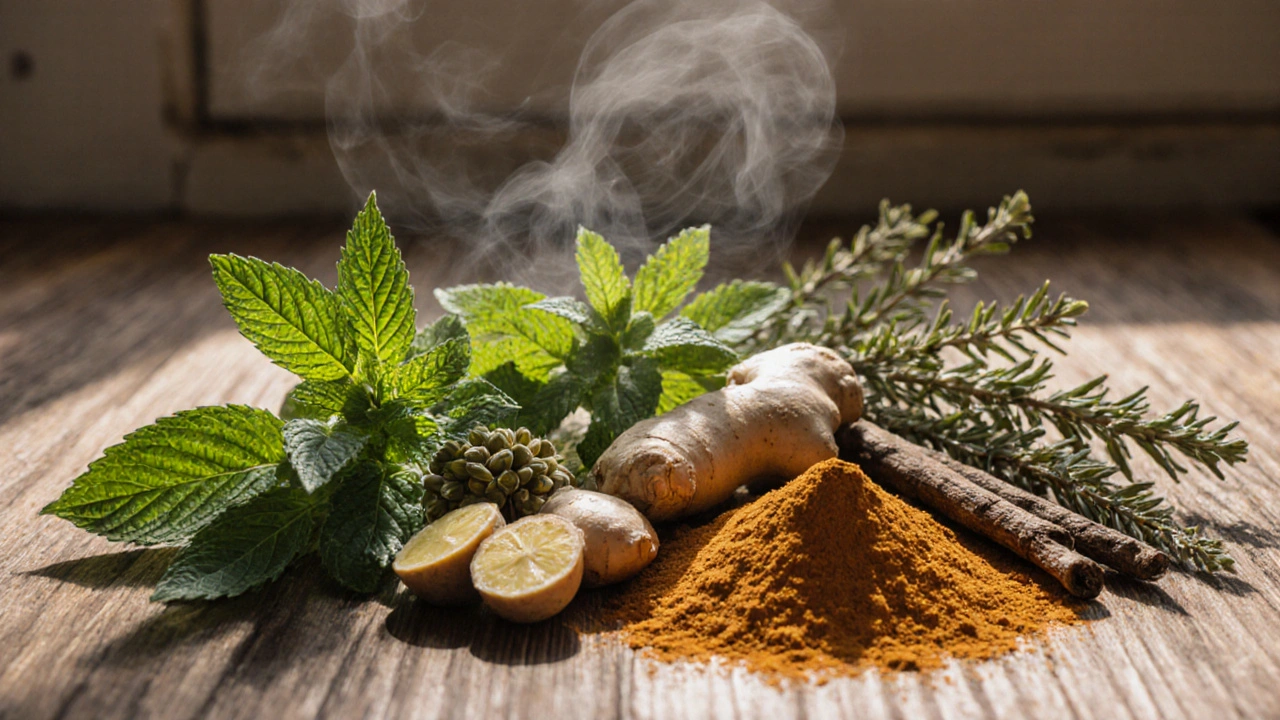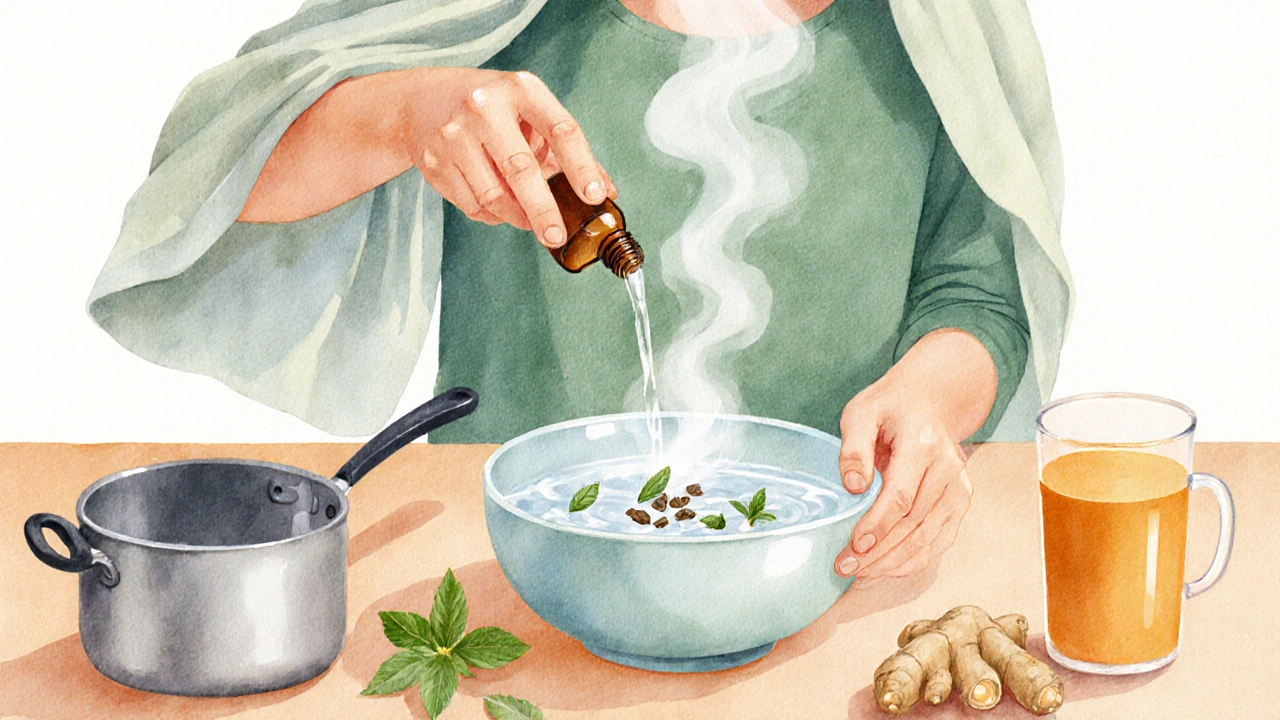 Oct, 14 2025
Oct, 14 2025
Respiratory Herb Selector
Symptom Assessment
Health Considerations
Key Takeaways
- Herbal remedies can reduce inflammation, relax airway muscles and loosen mucus.
- Eucalyptus, peppermint, ginger, turmeric, mullein, licorice root, thyme and oregano are the most studied herbs.
- Safe use requires proper dosing, awareness of drug interactions and quality sourcing.
- Simple tea, steam inhalation or tincture recipes can be added to a standard treatment plan.
- Consult a healthcare professional before replacing prescribed medication.
When it comes to chronic breathing disorders are conditions like asthma, chronic obstructive pulmonary disease (COPD) and allergic bronchitis that restrict airflow and cause wheezing, coughing, or shortness of breath, many people turn to nature for relief. Herbal remedies for breathing disorders are plant‑based preparations that target inflammation, mucus production and airway tone without the harsh side effects of some pharmaceuticals. This article breaks down the science, highlights the top herbs, and gives you a practical toolkit to use them safely.
How Herbs Help the Respiratory System
Plants contain dozens of bioactive compounds that act like miniature medicines. Three main mechanisms support breathing:
- Anti‑inflammatory action - compounds such as eucalyptol, gingerol and curcumin calm the immune response that swells airway walls.
- Bronchodilation - certain essential oils relax smooth muscle around bronchi, widening the passage for air.
- Expectorant effect - agents like saponins and mucilage loosen thick mucus, making it easier to cough out.
Scientific papers from 2022‑2024 consistently show that these pathways reduce symptom scores in asthma and COPD patients, especially when herbs complement conventional inhalers.

Top Herbs and Their Specific Benefits
Below are the eight most studied herbs for respiratory relief. Each description includes the key active ingredient, primary effect, and typical dosage.
- Eucalyptus is rich in eucalyptol, a natural bronchodilator and anti‑inflammatory agent. Add a few drops of eucalyptus oil to hot water for steam inhalation 2‑3 times daily.
- Peppermint contains menthol, which soothes irritated airways and acts as a mild decongestant. Brew a peppermint tea (1 tsp dried leaves per cup) up to three times a day.
- Ginger provides gingerol, an antioxidant that reduces airway inflammation. Slice 1‑2cm of fresh ginger and steep in hot water for a 10‑minute tea, twice daily.
- Turmeric delivers curcumin, a potent anti‑inflammatory that modulates cytokine release. Mix ½tsp of turmeric powder with warm milk and a pinch of black pepper, once a day.
- Mullein offers mucilage that coats the throat and eases cough. A mullein leaf tea (1 tsp dried leaves per cup) can be taken 2‑3 times daily.
- Licorice root contains glycyrrhizin, which reduces inflammation and protects the lining of the respiratory tract. Use a low‑dose licorice tea (½ tsp per cup) for up to 7days; avoid prolonged use if you have high blood pressure.
- Thyme is high in thymol, an antiseptic that relaxes bronchial muscles. Add 1tsp dried thyme to boiling water, steep 5minutes, drink twice daily.
- Oregano supplies carvacrol, which has both antimicrobial and anti‑inflammatory properties. Oregano oil (1 drop in a carrier oil) can be applied to the chest after dilution, 1‑2 times per day.
Safety, Interactions, and Contra‑indications
Herbs are natural but not automatically safe for everyone. Keep these points in mind:
- Pregnancy & breastfeeding: High‑dose licorice root, oregano oil and concentrated eucalyptus oil should be avoided.
- Medication interactions: Turmeric can enhance blood‑thinning drugs; ginger may affect anticoagulants; ephedra‑containing blends (not covered here) should never be mixed with stimulants.
- Allergies: If you’re sensitive to Lamiaceae family plants (mint, thyme, oregano), start with a tiny amount and monitor reactions.
- Quality sourcing: Choose organic, third‑party tested herbs. Look for certificates of analysis that confirm the absence of heavy metals and pesticides.
Always discuss herbal additions with your pulmonologist or GP, especially if you rely on inhaled corticosteroids or long‑acting bronchodilators.
Practical Guide: Making Herbal Remedies Work for You
- Identify your primary symptom - wheeze, cough, or congestion.
- Select 1‑2 herbs that target that symptom (e.g., eucalyptus for wheeze, mullein for cough).
- Choose a delivery method:
- Steam inhalation - add a few drops of essential oil to boiling water, cover head with a towel, breathe for 5‑10minutes.
- Herbal tea - steep dried herb in hot water, add honey if desired, drink 2‑3 cups per day.
- Tincture - combine 1part herb with 4parts alcohol, let sit 2‑4weeks, then take 10‑20drops diluted in water.
- Track results - use a simple log (date, dose, symptom rating) for 2‑3weeks to see if your breathing improves.
- Adjust or rotate - if after 2weeks you see no change, swap to a different herb or increase the dose within safe limits.

Checklist for Choosing High‑Quality Herbal Products
- Organic or wild‑crafted certification.
- Third‑party lab results posted on the seller’s website. \n
- Clear labeling - botanical name, part used, concentration.
- Non‑GMO and no added fillers or artificial flavors.
- Positive customer reviews that mention freshness and aroma.
Frequently Asked Questions
Can herbal remedies replace my inhaler?
No. Herbs are best used as complementary support. They can lessen the frequency of flare‑ups, but inhalers remain the fast‑acting safety net for acute symptoms.
How long does it take to notice improvement?
Most people report milder coughing or easier breathing within 7‑10days of consistent use, provided the chosen herb matches their symptom profile.
Are there any herbs I should avoid if I have high blood pressure?
Licorice root and high‑dose oregano oil can raise blood pressure. Stick to low‑dose forms or choose alternatives like peppermint or mullein.
Can I use these herbs for children?
Gentle teas made from mullein or mild peppermint are usually safe for kids over 5years, but always use half the adult dose and consult a pediatrician first.
What’s the best way to store dried herbs?
Keep them in airtight glass jars, away from sunlight and moisture. A cool pantry or a drawer in the refrigerator works well for long‑term freshness.
Next Steps and Troubleshooting
If you start a herbal routine and notice:
- Improved breathlessness - continue the regimen for at least 4weeks before assessing long‑term benefits.
- New wheeze or rash - stop the herb immediately and seek medical advice; you may be experiencing an allergic reaction.
- No change after 3weeks - consider swapping to a different herb or combining two complementary herbs (e.g., eucalyptus steam plus ginger tea).
Remember, the goal isn’t to replace professional care but to give your lungs extra support usingherbal remedies. With the right knowledge, quality products, and a measured approach, you can breathe easier and feel more in control of your health.

Karen Richardson
October 14, 2025 AT 21:20The article provides a clear overview of the phytochemical mechanisms underlying respiratory relief. It correctly distinguishes anti‑inflammatory, bronchodilatory, and expectorant effects. The inclusion of safety warnings for hypertension and pregnancy is commendable. However, the dosage recommendations could be more precise, especially for tinctures. Overall, the piece is well‑researched and informative.
Jaime Torres
October 14, 2025 AT 21:30Looks okay but kinda boring.
Wayne Adler
October 14, 2025 AT 22:50I gotta say, breathing issues can feel like a constant battle with an invisible enemy.
When you cant catch a full breath, it feels like your lungs are screaming for help.
The article mentions eucalyptol and menthol, which are definitely worth a try.
But dont forget that some herbs can interact with blood thinners, so read the warnings carefully.
Many people overlook the fact that licorice root can raise blood pressure, especially if you have hypertension.
Also, ginger and turmeric may make your clotting time longer, which is a problem if you are on anticoagulants.
Honestly, the piece could have dived deeper into the molecular pathways, not just the surface level benefits.
It mentions anti‑inflammatory effects, but the exact cytokine modulation is not explored.
Still, the practical tips for steam inhalation are a good addition to a holistic plan.
Just remember to use a towel over your head to trap the steam, otherwise you waste the effort.
For pregnant women, avoiding high‑dose licorice is crucial, but mullein tea is generally safe.
The article also suggests tracking symptoms, which is a smart way to gauge effectiveness.
In my experience, consistent use for at least two weeks shows noticeable improvement.
Patience is key; herbs are not instant fixes like pharmaceuticals.
Overall, it’s a solid starter guide, but consult a doctor before making big changes.
Sarah Kherbouche
October 14, 2025 AT 23:50This herbal garbage is just a ploy by eco‑hippies to make us ditch real medicine, lol.
Lawrence Bergfeld
October 15, 2025 AT 00:46Great summary, especially the part about eucalyptol’s bronchodilatory action, which can truly complement inhaler therapy, and the reminder to check for drug interactions, which many overlook, and the practical tips for steam inhalation, which are simple yet effective.
chioma uche
October 15, 2025 AT 01:46America needs to stick to its own herbs, not some foreign nonsense.
Stop listening to outsiders!
Satyabhan Singh
October 15, 2025 AT 03:00Esteemed readers, the discourse presented herein meticulously delineates the therapeutic potential of botanicals in ameliorating respiratory pathology. It is imperative that one appraises the pharmacodynamic attributes of eucalyptol, menthol, and curcumin with scholarly rigor. Moreover, adherence to stringent quality control protocols in herbal procurement cannot be overstated.
Keith Laser
October 15, 2025 AT 04:00Oh, absolutely, because nothing says ‘trustworthy health advice’ like a Reddit thread full of steam‑inhalation tips-sarcasm fully intended.
Winnie Chan
October 15, 2025 AT 05:00Haha, yeah, but at least it’s better than the usual bland medical jargon we get from the pros.
Kyle Rensmeyer
October 15, 2025 AT 06:00They dont tell u that big pharma is hiding the real cure its all a con lol :)
Rod Maine
October 15, 2025 AT 07:00Honestly the whole thing sounds like a amateur's attempt at naturopathy, lacking any real scientific gravitas.
Othilie Kaestner
October 15, 2025 AT 08:00I guess if you like sipping weird teas, go ahead-just dont expect miracles.